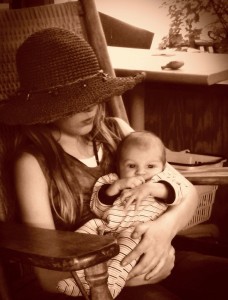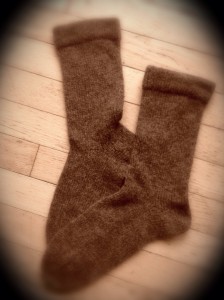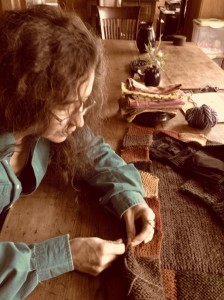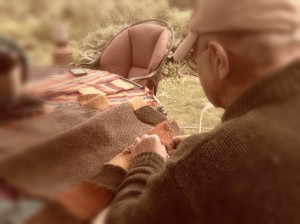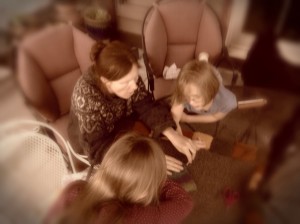I tried not to give much thought to the fact that it was Friday the 13th when I sat down with a cup of coffee a little over a week ago and began scrolling through my emails. I will admit that, on that day, my eyes glazed over the latest in the growing list of petition and donation requests for saving whales, protecting polar bear habitat and farmland, for safeguarding the water supply, to stop the use of glycophosphates, to label GMO foods, to fight discrimination. I suppose it is relatively painless to be an email activist, but today I couldn’t give my mind over to the troubles of the world. My eyes fell on one note from a friend, Melissa. Craving contact with someone closer to home than the polar bears, I clicked and began reading. She had just been diagnosed with breast cancer.
She is the second of my friends to be diagnosed in the last six weeks; the fourth of my friends to receive a diagnosis this year. I am beginning to fear breast cancer may be contagious. My fingers hovered over the keys, trying to think of appropriate words of comfort to send Melissa in these frightful hours that I knew were tearing at her soul.
I had none. Friday the 13th was the day of my Dad’s back operation. The inauspicious day had caused a number of raised eyebrows among our friends and neighbors when we announced his surgery. Dad was often asked why he accepted his appointment for then. “They had an opening,” was his dark humored reply. Given the opportunity, I would chime in with a bit of arcane history about the origin of Friday the 13th superstitions, hoping the historical explanation would assuage his fears that he might have bad luck on that day.
I was certainly aware that a back surgery was minor compared to breast cancer. Nevertheless, I closed Melissa’s email and tried to push it from my mind. Today, I had my own worries and concerns. The phone rang. The hospital was running ahead of schedule (I suspect there were a few cancellations owing to the unlucky date), and they had unexpectedly moved his surgery time up by one hour. My morning coffee respite would have to come to an abrupt end. Dad was on his way to pick me up, and we needed to leave immediately.
Setting my cup beside the sink, I grabbed the pieces of a baby blanket I was working on for my newborn nephew, TJ. Saoirse and Ula helped, shoving in the squares that each of them had knitted, the pile of crooked odd-shaped mismatched squares my brother had sent from California as his contribution, the stack of tightly knit precise pieces that Bob had muscled through, pulling out and knitting repeatedly in his efforts to create a flawless contribution.
I should divulge that TJ is not truly my biological nephew. He is not even my nephew by marriage. He and his two-year-old sister are the children of my brother’s best friend, Matt, who lived next door when we were growing up. Matt and his wife Erin moved back to Schoharie County a few years ago, and now they live only a few miles away. They never asked me if I wanted to be a surrogate auntie. They never had to. TJ is only a few weeks old, and already my heart skips at the mere sight of his little face.
Dad pulls into the driveway and toots the horn. I grab a picnic cooler where I’ve packed a lunch of comfort foods for my mom and me while we goes through surgery. Saoirse hands me a get well card she has made for her Pop Pop; Ula dashes to her money jar and hands me a dollar bill, hoping that will help. They go to the window to wave to Pop Pop in the car. I am glad that he cannot see through the darkened glass to know that they are sobbing. I dash out the door.
Conversation is awkward as Mom, Dad and I wind our way along narrow roads on our way to the hospital. I make chit chat about my newest book projects, about the farm customers. We swap the latest stories about Saoirse and Ula, we talk over business matters regarding the farm. I don’t remember many of the details, only the simple fact that I am consciously not mentioning to either of them that Melissa has breast cancer. I try to appear upbeat and optimistic, but I am a phony. I am frightened for my dad. I am distressed about Melissa, worried about her three year old son. I am maudlin about my other recently diagnosed friend, Lisa, who is battling breast cancer as she homeschools her ten year old daughter.
We check in at the hospital, and Dad is promptly whisked away to pre-op. Mom and I are shown to a waiting room. We try to choose a seat where we don’t have to watch a television blaring weather reports, pharmaceutical ads and sports scores. Like passengers waiting for a bus, we sit with our bags in our laps, unsure how long we will be in this space. She begins to cry.
I push my bag to the floor and grab her hand. It has been years since I have held hands with my mother. I marvel at their strength. After a few minutes, she pulls away to wipe her eyes. I lean down and pull from my knitting bag a thermos of hot water, a thermal cup and a bottle of valerian extract. I make her a cup of herbal tea to calm her nerves.
She takes a few sips before the nurse comes to find us. She leads down the hall and behind a curtain, where we will wait with my father before they begin the anesthesia.
I recognize Dad’s face, but nothing else. The clothes that define him: the stinky floppy hat he wears to protect his head in summer; the sweatshirt riddled with holes and caked with manure; the droopy jeans with grease smears and grass stains across the thighs — all the components of his daily wardrobe — have disappeared. He is wearing a hospital gown; his thread bare socks and his chronically smudged glasses the only vestige of his daily life as a farmer.
“The Lucky Socks!” I call out to mom suddenly. “Find his lucky socks!”
“Oh yes!” He forces a cheerful note of enthusiasm into his voice for my benefit. “I can’t forget my lucky socks!”
Mom rummages in his bag and finds a pair of brown woolen socks I made for him for his surgery. Lucy socks, I am hoping, will offset the effects of Friday the 13th. We pull off his ragged crew socks and replace them with the thick wool ones, trying not to jar his legs. He is unable to help us.
I fight back my tears. Just like he doesn’t need to know about Melissa’s cancer, he doesn’t need to witness my fear for him. He moves his legs slightly, and winces. The irritation of his nerves from his spinal stinosis is bad. One doctor told us it was a miracle he wasn’t blacking out from it. Mom and I hold our breath as we watch the suffering strike across his face like an unwanted bolt of lightning.
Surgery is his last resort. We know his quality of life has been poor these past few years. We know there are days when the shooting pain has been so strong, the antics of Saoirse and Ula have been the only reason for him to maintain his interest in this world. Thus, we’ve tried to keep them at the farm with him constantly as salves to his suffering.
There was only one chair in the little curtained off space where we waited. I offered it to mom, then perched on the side of Dad’s bed. The truth of the moment weighed heavily on all of us, and we were losing our ability to make idle chatter to camouflage it. Was this the starting place of renewed vitality and joy for Dad? Or was this the beginning of the end?
In need of comfort and release from my fears, I pulled the pieces of TJ’s blanket from the bag. Lacking adequate workspace, I spread them across his lap and began stitching the squares together. Mom and Dad were silent and completely still; the motion of my needle and yarn moving through the stitches the only activity. Lacking other distraction, they sat and watched.
The rhythm of the work calmed my mind, but I felt deep sadness as I stitched this gift for my newborn nephew. I thought about that little soul, so fresh in this world. I wanted him to have a life filled with joy, but sitting on the edge of my dad’s hospital bed, I knew there would be more to TJ’s life than warm cuddles under wool. No matter how perfect his world is, he, too, will have friends who battle cancer. He, too, will sit on the edge of a hospital bed of someone he loves, fearing he might lose them. Some days, the battle with cancer will be victorious. Some days it won’t. Some days the moments beside the hospital bed will be forgotten in the face of speedy recovery; some days they will be remembered as the last moments before his world is turned upside down.
I tried to push these thoughts from my head as I fastened the pieces together. I want only happy thoughts sewn into this baby boy’s new life.
The nurse comes. She gives Dad a pill to swallow, then begins lifting the rails on his bed to roll him away. Mom and I jump up and kiss him. Sharing his penchant for black humor in the face of superstition, I tell him to “break a leg” for good luck. Mom and I hold hands once more as we follow the gurney down the hallway. The nurse stops at another door, directing us to go in and wait in this new room. “The surgeon will be ready to speak with you in three hours,” she calls over her shoulder. Within moments, Dad is wheeled out of site.
Mom and I enter the windowless room. We arrange our bags. We sit. We stand again, seeking a more comfortable location. We arrange our bags once more. We sit again. Finally, we give up and make for the cafeteria with hopes for finding a window beside which we can set up our picnic lunch.
We eat. The first hour goes by. We take the car out to find a gas station. The second hour passes. We return to the waiting room anticipating our meeting with the surgeon. I pull out the pieces of TJ’s blanket once more. I stitch a square. Mom watches me. I fumble in my notions bag and find a second darning needle, then break off a handful of yarn. I hand it to her, and she, too, begins to stitch. The third hour goes by. We notice the time, but we say nothing. We keep stitching TJ’s blanket.
My thoughts from earlier in the day, about the inevitable sadness in TJ’s life, haunt me as I whip the little squares together. But as I push my needle through the corner of one square, a thought occurs to me. Sadness is a sign of joy. I recall a stanza from Kahlil Gibran’s writings:
Your joy is your sorrow unmasked.
And the selfsame well from which your laughter rises was oftentimes filled with your tears.
And how else can it be?
The deeper that sorrow carves into your being, the more joy you can contain.
If TJ’s life unfolds in the way that I hope, he will be surrounded by love and connection. He will have secure bonds with his parents, with his grandparents, with his uncles and aunts. There will be people in his life for whom the ties run so deep, he will think of them as family, even if there is no biological connection. He will have many friends for whom he will care deeply. And there will be moments in life when those joys will unveil sorrow; and in their unveiling, he will realize the fortune he enjoys in love and connectedness.
In those thoughts, I lose my own self pity. I am worried about my father because he is such a source of happiness in my life. Breast cancer is not a contagious disease. It’s sudden appearance is a sign that I am blessed with many wonderful women friends of all ages.
A phone rings in the waiting room. My father has woken up, he is ready to see us. Mom hands off the stitching she has completed, and I shove all the pieces in the bag. We walk out of the room to go find him. She begins to cry, fearful of what lies ahead. I take her hand once more,now familiar with the power in her grip.
All of the patients in recovery are masked behind curtains as we make our way down the hall. We are unsure which bay holds my dad, until I see a pair of brown woolen lucky socks peeking out from one of them. The toes are wiggling, a very good sign.
He is groggy when we find him, but he is marveling at the fact that he is able to move his feet. “There were a lot of nerves down there,” he reminds me. “I don’t think it would have been hard for the surgeon to accidentally sever one.” The possibility of permanent paralysis was not lost on him. He wears his lucky socks for the next two days,refusing to remove them.
But on the third day, Fathers’ Day, he relinquishes them. He is able to change his own socks. He and Mom drive up to the house to have brunch with our family, along with my sister Dawn, and her partner, Bill. The meal is running late, as we are short-handed on the farm while dad recuperates. Nobody cares. We are all thankful for the sunshine, for Dad’s ability to stand, walk, and sit in a chair without wincing in pain. TJ’s blanket it passed around. Saoirse and Ula each stitch in a few squares. Dawn stitches in a square. Dad even stitches in a square, each of us wishing for TJ all the blessings and joys that life can offer.
Later that night, after everyone has left, I sew the final pieces together, then wash the blanket and spread it out on the floor to block it. As I set the pins around the borders to shape it, I give a prayer of thanks for my Dad’s recovery. And then, my thoughts turn to Melissa and Lisa, and I begin making prayers for their health and healing. That’s life, TJ, I direct my thoughts to the blanket. If you are endowed with wonderful people in your world, they will forever hold a place in your heart, making your life a running stitch of joys and sorrows, hopes and prayers. And that, my sweet little baby boy, is my wish for you.
While my friend Lisa feels that they will be economically secure as they proceed through her treatments, my friend Melissa will face some financial hardships during this time. Ordinarily, I ask that you consider supporting my weekly writings by supporting our farm or considering the purchase of one of my books. Today, I would like to ask you to consider supporting my work by making a small donation to Melissa’s family as they make their way through the coming months. You can read more about what she faces here.

